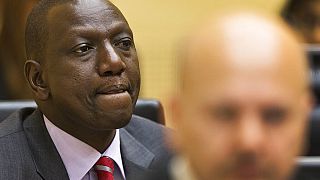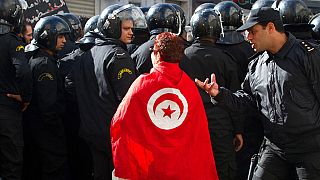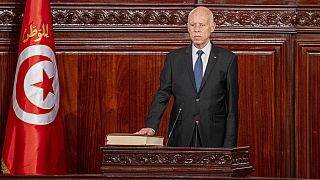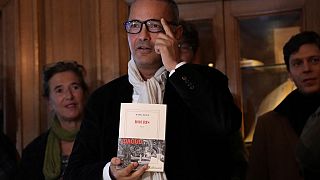Tunisia
The European Union and Tunisia signed a "strategic partnership" in Tunis on Sunday, focusing on the fight against illegal immigration, but also designed to support the North African country in the face of serious economic difficulties.
The President of the European Commission, Ursula von der Leyen, welcomed the agreement, which will enable Tunisia to "invest in shared prosperity", citing "five pillars", including the all-important question of migration.
Along with Libya, Tunisia is the main point of departure for thousands of migrants crossing the central Mediterranean to Europe.
Italian Prime Minister Giorgia Meloni and Dutch Prime Minister Mark Rutte accompanied the European leader after the trio's first visit a month ago, during which they proposed this partnership.
The five pillars are "macro-economic stability, trade and investment, green energy transition, people-to-people links, migration and mobility", says the Commission in a press release.
The Memorandum of Understanding marks "another important step towards tackling the migration crisis in an integrated way", said a delighted Mrs Meloni, who has invited Tunisian President Kais Saied to attend a summit on migration in Rome next Sunday.
Among other things, they agreed to extend the Erasmus exchange program to Tunisia and to provide €65 million in aid for 80 schools.
On the energy front, the European leaders recalled that Tunisia is involved in projects for an undersea fiber-optic cable and an electricity cable to link the two shores of the Mediterranean.
Mrs von der Leyen stressed that the EU was keen to support the development of renewable energies in the Maghreb country, which has "enormous potential".
According to Ms Meloni, the partnership between Tunisia and the European Union (EU) "can be seen as a model for the establishment of new relations with North Africa".
As for immigration, Mr. Rutte felt that the agreement would enable "better control of irregular immigration".
President Saied addressed this issue to his counterparts, calling for "a collective agreement on inhumane immigration and (forced) displacement operations by criminal networks".
- New means of cooperation" -
"Tunisians have given these immigrants everything that could be offered with unlimited generosity", pleaded Mr. Saied, strongly criticized for the way in which hundreds of migrants were arrested in Tunisia, then "deported", according to NGOs, to inhospitable areas on the borders with Algeria and Libya.
Testimonies given to AFP by telephone and videos sent to NGOs in Tunisia showed women and children abandoned in the middle of the desert without water, food or shelter.
Testimonies given by telephone to AFP and videos sent to NGOs in Tunisia showed women and children abandoned in the middle of the desert without water, food or shelter.
Libyan border guards told AFP on Sunday that they had rescued at least 70 migrants wandering in unbearable temperatures and without any help in a border area between the two countries.
An increasingly openly xenophobic discourse has spread in Tunisia since Mr. Saied, who took over full power in July 2021, denounced illegal immigration in February, referring to "hordes of sub-Saharan migrants" who, he claimed, had come to "change the demographic composition" of the country.
In concrete terms, the agreement between Brussels and Tunis provides for 105 million euros in aid to combat illegal immigration.
The EU has also promised direct budgetary aid of 150 million euros in 2023, at a time when Tunisia, strangled by a debt representing 80% of its GDP, is running out of cash, causing regular shortages of basic necessities purchased directly by the state.
During its first visit, the European troika had referred to "macro-financial assistance of 900 million euros", in the form of a loan that would have been provided to Tunisia over the next few years.
Mrs. von der Leyen affirmed on Sunday that Brussels remained "ready to provide this assistance as soon as the conditions are met".
But this "assistance" is conditional on an agreement between Tunisia and the International Monetary Fund (IMF) on a new $2 billion credit, a dossier that has been deadlocked for months.
President Saied rejects two indispensable conditions for an agreement with the IMF: the lifting of subsidies on basic products and the restructuring of ailing state enterprises.
We need to "find new means of cooperation outside the international monetary framework", he said on Sunday.




![Benin: Tapping the potential of luxury tourism [Business Africa]](https://static.euronews.com/articles/stories/08/77/73/68/320x180_cmsv2_a773df46-cd22-5d35-919e-78866828bd47-8777368.jpg)








00:53
Pope Francis calls for empathy and justice in welcoming Migrants
01:02
EU leaders summit opens with more tightened migration policy in the works
Go to video
One dead, two missing as boat with 100 migrants sinks near Greece
11:07
The economy, the challenge of Kaïs Saïed's second term [Business Africa]
Go to video
France: Revealed in the cinema, Abou Sangare still threatened with expulsion
Go to video
Africans recruited for Russian jobs say they were tricked into building Ukraine drones